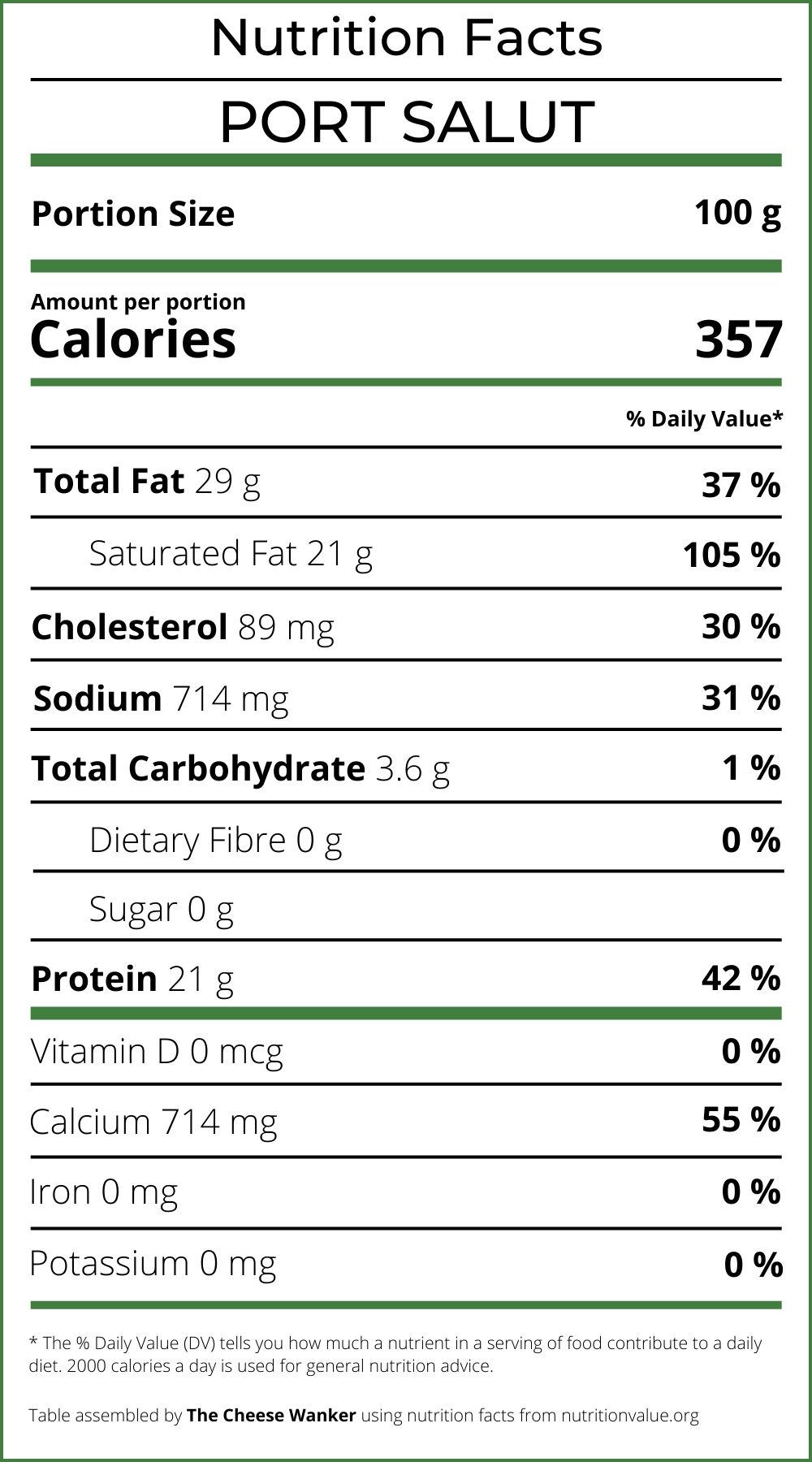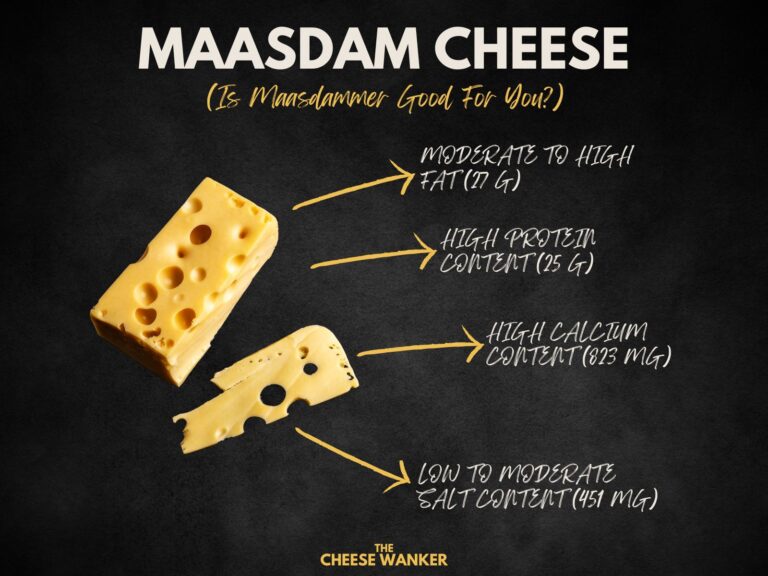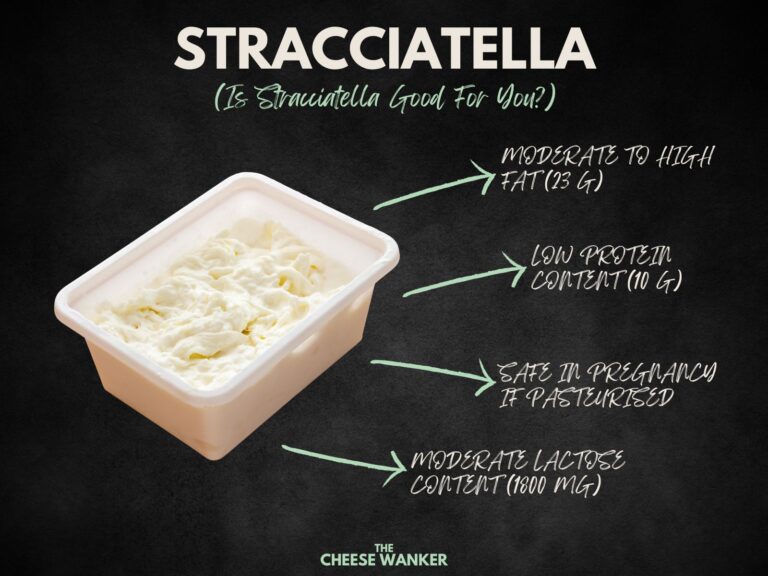Port Salut cheese is a soft washed rind cheese that was originally created by French Trappist monks in the 19th century. It is made from cow’s milk and has a distinctive orange rind, while the cheese itself is creamy, mild and nutty in flavour. Read on to learn about the nutrition facts for Port Salut cheese.

SEE ALSO: Nutrition facts for popular world cheeses in The Cheese Wanker’s index →

Nutrition Facts Summary for Port Salut
Without a doubt, Port Salut is a very popular commercial French cheese. Here are some of its key nutrition facts:
Lactose Intolerance
If you are lactose intolerant, Port Salut cheese may be a good option for you as it is a low lactose cheese. This means that it contains less than 1 gram of lactose per serving, making it easier to digest for those who are lactose intolerant.
Find out everything you’ve ever wanted to know about lactose free cheeses by clicking here.
Fat Content
In terms of fat content, Port Salut cheese is not a low-fat cheese. Indeed, one serving of 100 g contains around 29 g of fat. However, it is important to note that not all fats are created equal. Port Salut cheese is a good source of healthy unsaturated fats which can help to lower cholesterol levels when consumed as part of a balanced diet.
Moreover, it is a good option for people following a ketogenic diet. You can learn more about the keto diet and which cheeses are most keto-friendly by clicking here.
Protein Content
The protein content in Port Salut cheese is moderate, with 100 g containing around 21g of protein. Protein is important for maintaining and repairing body tissues, so including a moderate amount of Port Salut cheese in your diet can be beneficial.
Want to find out which cheeses have the highest protein content? Click here for our blog post covering this topic.
Safety in Pregnancy
For pregnant women, Port Salut cheese is generally considered safe to eat as long as it is made with pasteurised milk. However, it is recommended to avoid soft cheeses that are made from unpasteurized milk as they can increase the risk of foodborne illness.
You can read more about which cheeses are safe to eat when you’re pregnant by clicking here. As always, if unsure, you should consult your doctor.
Salt Content
Finally, Port Salut is also relatively high in sodium. In fact, one serving of 100 g contains around 714 mg of salt, which is around 31% of the recommended daily intake. Excessive salt consumption has been linked to a range of health issues such as high blood pressure and increased risk of stroke. Hence, it is important to consume Port Salut in moderation.
Conclusion
In conclusion, Port Salut cheese is a tasty and nutritious cheese that can be enjoyed as part of a balanced diet. While it is not a low-fat cheese, it is a good source of healthy unsaturated fats and protein. It is also low in lactose, making it a good option for those who are lactose intolerant.
However, it is important to consume Port Salut cheese in moderation due to its relatively high salt content. Overall, Port Salut cheese can be a delicious addition to your diet as long as it is consumed in moderation alongside a healthy and varied diet.
References
Overall nutritional content
The nutritional content of cheese in our table comes from the USDA Food Data Central Repository, the Australian Food Composition Database and cheese manufacturers. We realise that there can be variations between different brands and producers. Hence, the numbers we have used are averages.
Fat content
Our fat RDI data comes from Cleveland Clinic’s Healthy Fat Intake resource.
Type of fat in cheese as per Harvard T.H. Chan’s The Nutrition Source.
Protein content
Our protein RDI data comes from Harvard Medical School’s Harvard Health Publishing.
Cholesterol content
Is There a Correlation between Dietary and Blood Cholesterol? Evidence from Epidemiological Data and Clinical Interventions? – Maria Luz Fernandez and Ana Gabriela Murillo
Saturated fat, carbohydrate, and cardiovascular disease – Patty W Siri-Tarino, Qi Sun, Frank B Hu and Ronald M Krauss
Effect of cheese consumption on blood lipids: a systematic review and meta-analysis of randomized controlled trials – Janette de Goede, Johanna M Geleijnse, Eric L Ding, Sabita S Soedamah-Muthu
Safety in pregnancy
All the advice relating to what cheeses you can eat during pregnancy in this article is based on the recommendations by health authorities in Australia, the UK and the USA. If you are unsure about what you can or cannot eat, please consult your doctor.
Australia – FSANZ, United Kingdom – NHS and United Sates of America – FDA
Lactose content
Lactose residual content in PDO cheeses
Detection of lactose in products with low lactose content
The analysis of lactose in milk and cheese products by HPLC
Food Standards ANZ Food Composition Database
Lactose & Galactose content of cheese



